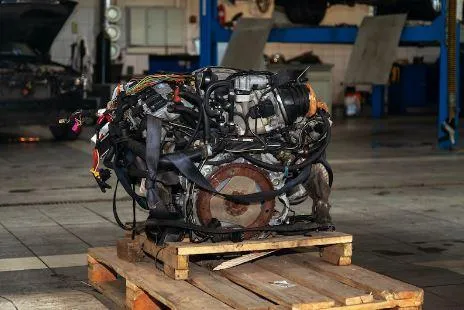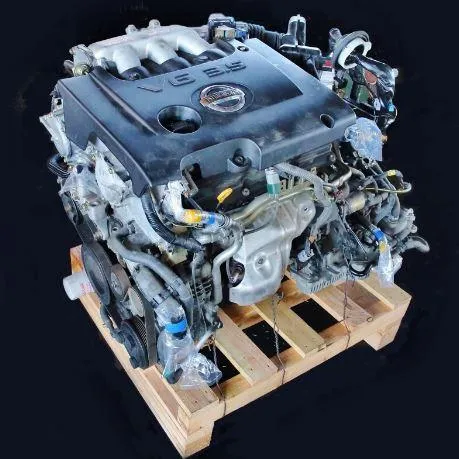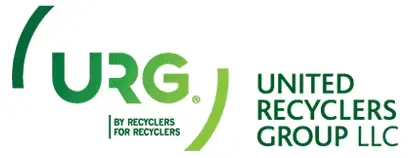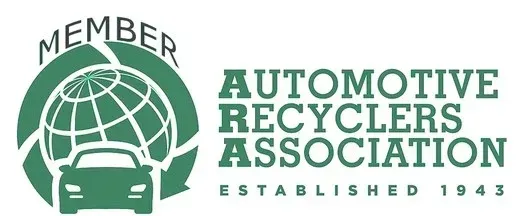Mon - Fri: 8am - 5pm, Sat - Sun: Closed

6-36 Month Warranties
We Ship Local.
Hablamos Español.
Connect with
Salvaged Engines - Dive Deep Into The Process of Recycling Engines
Ford Transmissions
Salvaged
Engines - Dive Deep Into The Process of Recycling Engines
Curious about the next chapter in a car engine's life after its road days are over? You've just stepped into the fascinating realm of salvaged engines, a key aspect of recycling engines! This trend is quickly gaining momentum, blending environmental care with savvy savings.
Today, we’ll be diving deep into how are engines recycled, breathing new life into old rides. Should I buy a recycled engine? It's a smart choice for car lovers and everyday drivers alike, highlighting the value of recycled engines.
Ready to see how these engines give old cars a new lease on life while being kind to our planet? Let's explore the process of recycling engines in the world of salvaged engines, where every old engine has a new story to tell. Join us on this enlightening journey!

What Are Salvaged Engines?
Salvaged engines, a form of recycling engines, are like hidden treasures from vehicles that have been retired, damaged, or deemed beyond repair. Unlike their new counterparts, which come straight from the factory, or used engines, which are simply removed from another vehicle without any refurbishment, salvaged engines have a unique story. They're rescued from vehicles that can't hit the road anymore but still have plenty of life left in their mechanical hearts.
How They Stand Apart?
The key difference between salvaged engines and others lies in their journey. A used engine is sold as-is, possibly with wear and tear. A new engine is fresh, untouched. Rebuilt engines, on the other hand, are disassembled, inspected, and have damaged parts replaced before being reassembled. Salvaged engines, in the context of how are engines recycled, are given a second chance at life through a careful process that evaluates, repairs, and ensures they're ready to roar again.
The Recycling Process of EnginesHow They Stand Apart?
Step 1: Dismantling
The recycling process kicks off with dismantling, where engines are carefully removed from vehicles. This step is more than just taking out the engine; it's about doing so in a way that prevents any further damage to the engine itself and allows for the recovery of other usable parts. It's a meticulous process that sets the stage for what comes next, ensuring that everything that can be saved, will be.
Step 2: Cleaning and Inspection
Once the engine is out, it's time for a thorough cleaning. This isn't just about making it look good; it's crucial for revealing any hidden issues like cracks or wear that weren't visible before. After cleaning, a detailed inspection follows. This step determines what's still in good shape and what needs to be replaced or repaired. It's a critical juncture that ensures only quality parts make it through.
Step 3: Repair and Replacement
After identifying which parts need attention, the repair and replacement phase begins. This involves fixing what can be fixed and swapping out what can't. It's a delicate balance between preserving as much of the original engine as possible and ensuring it will run reliably. This stage is all about restoring functionality while keeping sustainability in mind by reusing and recycling parts.
Step 4: Testing
Testing is where the rubber meets the road, quite literally. Engines are put through their paces to ensure they meet or exceed original performance standards. This includes everything from basic functionality tests to more rigorous performance assessments. It's a non-negotiable step that guarantees the engine isn't just ready to go back into a vehicle but is also safe and reliable.
Step 5: Reassembly
The last step is reassembly, where the engine is put back together with both salvaged and, if necessary, new parts. This isn't just about putting pieces back where they belong; it's about doing so in a way that ensures the engine operates smoothly. It's the culmination of the recycling process, where the engine is finally ready to begin its second life.
Step 6: Environmental Impact
Throughout each step of the recycling process, sustainability is a constant focus. From minimizing waste by salvaging usable parts to reducing the need for new raw materials, the environmental impact is significant. Are salvaged engines worth buying? Recycling engines not only saves energy but also reduces greenhouse gas emissions, making it a win-win for both the planet and consumers looking for a cost-effective, reliable engine option.
Benefits of Choosing Salvaged Engines
Choosing salvaged engines offers a host of benefits, both for your wallet and the planet:
✔ Cost Savings: Salvaged engines are significantly less expensive than their new or fully rebuilt counterparts, making them a budget-friendly option for repairs and restorations.
✔ Reduced Waste: Opting for a salvaged engine helps reduce the amount of waste sent to landfills and decreases the demand for new raw materials, contributing to a more sustainable environment.

✔ Reliability: Despite common misconceptions, salvaged engines can be just as reliable as new ones, especially when sourced from reputable suppliers. They undergo thorough testing and inspection to ensure they meet high standards of performance.
✔ Performance: Salvaged engines often retain their original performance characteristics, making them suitable for a wide range of automotive needs, from daily driving to more specialized applications.
Considerations Before Buying a Salvaged Engine
✔ Warranty: Look for salvaged engines that come with a warranty. This offers peace of mind and protection against potential issues.
✔ Compatibility: Ensure the engine is compatible with your vehicle. Check engine codes and consult with experts if necessary to avoid costly mistakes.
✔ Condition: Inquire about the engine's condition. Ask for detailed photos or, if possible, inspect it in person.
✔ History: Request documentation on the engine's history. This includes mileage, previous repairs, and reasons for salvaging, to gauge its reliability and performance
.
Let’s Wrap Things Up
Recycling engines offer both economic and environmental perks, making salvaged engines a savvy choice for those looking to save money and the planet. These engines demonstrate that you don't have to compromise on reliability or performance to be eco-friendly.
As we aim for a more sustainable future, consider salvaged engines for your vehicle's needs. They're a testament to how we can support the circular economy and keep our rides in top shape. Interested in learning more?
Visit our website to discover how salvaged engines can benefit you and the environment.
Get our latest news and promos
QUALITY ASSURED


SATISFACTION GUARANTEED

UNPARALLELED SUPPORT
Houston Engines
Proud Member



Social Media
Payments Accepted
Ship Via











